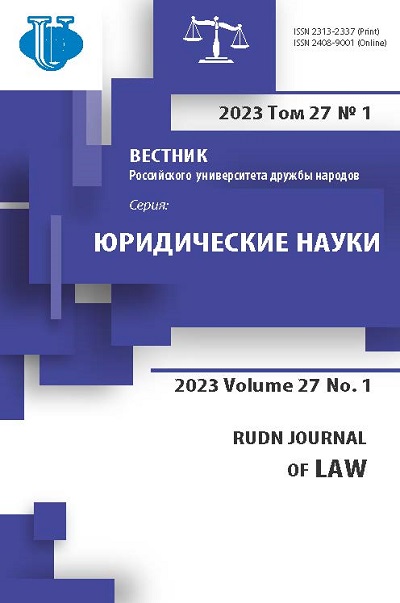Blockchain, metaverses and NFT in civil procedure and arbitration in Russia, China and USA
- Authors: Ermakova E.P.1
-
Affiliations:
- Peoples’ Friendship University of Russia (RUDN University)
- Issue: Vol 27, No 1 (2023)
- Pages: 148-165
- Section: Civil and Arbitration Process
- URL: https://journals.rudn.ru/law/article/view/34062
- DOI: https://doi.org/10.22363/2313-2337-2023-27-1-148-165
- ID: 34062
Cite item
Full Text
Abstract
The research is devoted to the study of new technologies - blockchain, metaverse and NFT - in civil procedure and arbitration in Russia, China and USA. The author analyzes the basic concepts and characteristics of the above technologies and gives examples of their use in judicial practice. Recent US judicial precedents (2021 and 2022), which consolidate the possibility of using blockchain and NFT technologies in court proceedings are looked at. The research aims at shaping the idea of possible application of blockchain, metaverse and NFT technologies in civil proceedings; it is based on the analysis of regulations, judicial practice of Russia, foreign countries, and scientific sources. The employed methodology is empirical methods of comparison, description, and interpretation, theoretical methods of formal and dialectical logic. Private scientific methods include legal-dogmatic method and interpretation of legal norms. The outcome of the research shows that blockchain and NFT technologies have become an effective tool used by the courts of USA and China in the analysis of electronic evidence and some other procedural actions including notification of an unknown defendant through a non-interchangeable token (NFT). The research came to the following conclusions. Blockchain transactions are often called anonymous or at least pseudonymous, but this is not the case. The issue of blockchain anonymity has been raised in several cases heard by US courts. The blockchain analysis of tools industry has allowed the court and the parties to the dispute to analyze transactions on the blockchain and in many cases trace them to an identifiable user, even if such users have taken steps to conceal their identity. It is essential to refer to the US courts experience allowing private companies to conduct Technology Assisted Review (TAR).
About the authors
Elena P. Ermakova
Peoples’ Friendship University of Russia (RUDN University)
Author for correspondence.
Email: ermakova_ep@rudn.ru
ORCID iD: 0000-0001-5722-3641
Candidate of Legal Sciences, Associate Professor of Civil Procedural Law of Department of Civil Law and Civil Procedure and Private International Law, Law Institute
6 Miklukho-Maklaya str., Moscow, 117198, Russia FederationReferences
- Bergquist, C. (2021) Virtual Hearings and Blockchain Technology Solutions in Criminal Law. Mitchell Hamline Law Review. 47(3), 1249-1286. Available at: https://open.mitchellhamline.edu/mhlr/vol47/iss3/10 [Accessed 14th November 2022].
- Bonner, A.T. (2016) Scientific and technological progress and prospects for the development of procedural legislation and judicial practice. In: Golubtsov, V.G. & Kuznetsova, O.A. (eds.). Sixth Perm Congress of Legal Scientists: Selected materials. Statute Publ. pp. 288-295. (in Russian).
- Brisov, Yu.V. & Pobedkin, A.A. (2022) Legal regime of NFT (non-fungible token) in Russia: How to work in the absence of special legislative regulation? Digital Law Journal. 3 (1), 44-66. https://doi.org/10.38044/2686-9136-2022-3-1-44-66 (in Russian).
- Deng, Z. (2020) Influence of E-commerce Innovation on Consumer Behavior in China Case: Alibaba Group. International Business. Available at: https://www.theseus.fi/handle/10024/ 347934 [Accessed 14th November 2022].
- Ermakova, E.P. (2022) New forms of dispute resolution as a reflection of innovation in law enforcement. In: Molchanov, V.V. (ed.). The doctrine of civil procedure: present and future: a collection of reports at the I International Scientific Conference in memory of M.K. Treushnikov. 9 th February 2022. Moscow: Zertsalo-M Publ. pp. 115-119. (in Russian).
- Ermakova, E.P. & Frolova, E.E. (2021) Artificial intelligence in civil litigation and arbitration: The experience of the United States and China. Yurlitinform Publ. (in Russian).
- Ermilov, V.B. (2022) Digital evidence in the bankruptcy case associated with the imposition of vicarious liability hidden beneficiary. Law and State: theory and practice. 3 (207), 81-83. https://doi.org/10.47643/1815-1337_2022_3_81 (in Russian).
- Graski, D. & Embley, P. (2018) When Might Blockchain Appear in Your Court? National Center for State Courts. 28-32. Available at: https://www.ncsc.org/__data/assets/pdf_file/0018/ 14913/blockchaininthecourts.pdf [Accessed 14th November 2022].
- Izmaylova, A.A. (2021) Metaverse as a new economic system. Modern Economy Success. (6), 175-179. (in Russian).
- Kupchina, E.V. (2022) The influence of digital technologies on the development of modern arbitration: On the example of the American Arbitration Association. Eurasian Legal Journal. 9 (172), 51-55. (in Russian).
- Murray, D. et al. (2007) Discovery in a Digital Age: Electronically Stored Information and the New Amendments to the Federal Rules of Civil Procedure. Uniform Commercial Code Law Journal. 39 (4), 509-531.
- Rusakova, E.P. (2022) The impact of digitalization on civil proceedings in Russia and abroad: the experience of China, India, Singapore, the European Union, the USA, South Africa and some other countries: Abstract. Diss. … Doctor of Legal Sciences. Moscow, RUDN Publ. (in Russian).
- Rusakova E.P., Frolova, E.E. & Gorbacheva, A.I. (2020) Digital rights as a new object of civil rights: Issues of substantive and procedural law. Advances in Intelligent Systems and Computing. (1100), 665-673. https://doi.org/10.1007/978-3-030-39319-9_74
- Schwinger, R. (2022) Anonymous no more: Blockchain analytics in the court. New York Law Journal. Available at: https://www.nortonrosefulbright.com/-/media/files/nrf/nrfweb/knowledge-pdfs/us_42855_reprint-pdf_anonymous-no-more_blockchain-analytics-in-the-courts_r3.pdf?revision=ef9df8dc-2175-441c-a1a5-67495ce2ef38&revision=ef9df8dc-2175-441c-a1a5-67495ce2ef38 [Accessed 14.11.22]
- Tang, S. (2021) How Emerging Technologies Shape the Face of Chinese Courts? Conflict of Laws.net. Available at: https://conflictoflaws.net/2021/how-emerging-technologies-shape-the-face-of-chinese-courts%EF%BC%9F/ [Accessed 14th November 2022].
- Ward, B. et al (2007) Computer Forensics, E-Discovery, and Spoliation: Impact of the New Federal Rules. AMCIS 2007. Proceedings. Paper 153. Available at: http://aisel.aisnet.org/amcis2007/153 [Accessed 14th November 2022].
- Zatsepin, M.N., Permyakov, M.V. & Morozova, E. (2020) On the Use of Blockchain Technologies in the Judicial System of the Russian Federation. Advances in Social Science, Education and Humanities Research. (420), 170-173. https://doi.org/10.2991/assehr.k.200321.106
Supplementary files















